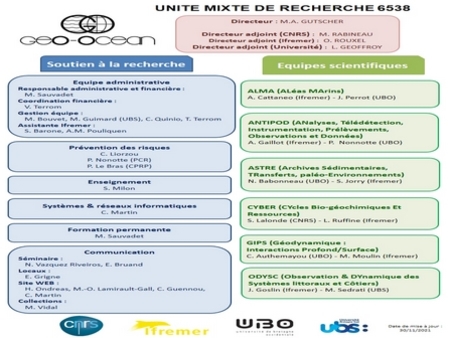Geophysics & Geodynamics
Geophysical technician
Pauline is a technician specialized in seismic data processing working with the Geological Hazards and Sedimentary Dynamics Laboratory.
What does your job involve ?
I am a technician specialized in seismic data processing in the field of geophysics and more precisely in seismic exploration tools. I work mainly on signal analysis, seismic imagery processing and the application of seismic data acquisition tools.
My tasks are varied: acquistion and quality control of seismic reflexion data during scientific ocean-going expeditions, onshore seismic data processing using processing software, technical report drafting, at-sea testing of new equipment specialized in seismic data acquisition.
Once the quality control of data is completed, the results are conveyed to the researchers in order for them to orientate their works after oceanographic cruises or their choices in onshore processing.
What training did you have ?
I obtained a scientific baccalaureat specializing in mathematics, and then a DEUST in Vibration Acoustic Signals and finally a degree in Vibratory and Acoustic Engineering.
Geophysical Engineer
Yannick is a geophysical engineer specialised in seismic exploration tools.
What is your job within the Geoscience Research Unit at Ifremer ?
I am a geophysical engineer specialized in seismic exploration tools within the Seismic Imagery team. My fields of competence are signal analysis, physics, the specification and expertise of data acquisition tools, seismic imagery processing. One of the specificities of Ifremer is its work on integrated projects, from the specification of measurement tools and their development to their implementation for use of the scientific community. Another interesting part of my work if the variety of the fields of application: paleo environmental studies, geological hazards, mineral resources from the continental shelf to the deep sea, study of the water/sediment interface processes, and more recently study of the oceanic layers. These works are pluri disciplinary and imply interaction with geologists, geochemists and oceanographers.
What does your work involve ?
My work is varied : technical report drafting, new development propositions, at-sea testing of new equipment, data expertise, acquisition strategy and quality control during scientific cruises, development of seismic imaging software, training of scientific users, participation in the drafting of scientific articles.
What training did you have ?
I trained as a geophysical engineer (EOST, Strasbourg). I then pursued a Masters in oil exploration at the Institut Français du Pétrole.
Researcher in marine geoscience specialized in geodynamics
Maryline is a researcher in marine geoscience specialized in geodynamics.
What is your job within the Geoscience Research Unit at Ifremer ?
I mainly work on passive continental margins to understand their formation: how do we go from a continental crust of 30 km thick to an oceanic crust of 7 km thick. To try to attempt to reply to this question, I work in several areas of the globe: Mediterranean, Brazil, the Mozambique Channel using multi-trace seismics and an ocean-bottom seismometer which provide images of the margins. We compare the results obtained in each geographical area to identify the common formation processes.
One of the most important aspects of my work is to place our observations on the margins within a precise paleo-geographic framework and to work on the movement of the great tectonic plates throughout time. To this end, we have moreover, developed a software called Place3D which moves the tectonic plate theory around the globe. We work in close collaboration with the group of geophysicians (for the data processing) and the sedimentologists (interpretation of sediment filling of the margins).
What does your work involve ?
My job is varied: from the preparation of scientific cruises (drafting of cruise propositions), leading scientific cruises on Ifremer oceanographic ships (L'Atalante, Pourquoi pas ?) during which we acquire seismic reflection and refraction data over 30-40 days to the processing and interpretation of data and the drafting of scientific articles to communicate our work throughout the scientific community. I also participate in national and international conferences to present our work. I follow numerous students (Masters, PhD and post doctorat) to support them in their integration into research.
What training did you have ?
I have a university education and travelled widely before integrating Ifremer. I started university at Saint-Etienne and passed my degree and Masters in Brest. I then obtained my "DEA" in Montpellier before returning to Brest for my PhD in 2003. I then spent 6 years in Lisbon at the Institut Dom Luis, University of Lisbon, where I continued to work in close collaboration with Ifremer, in particular on projects on the Brazilian margins.

